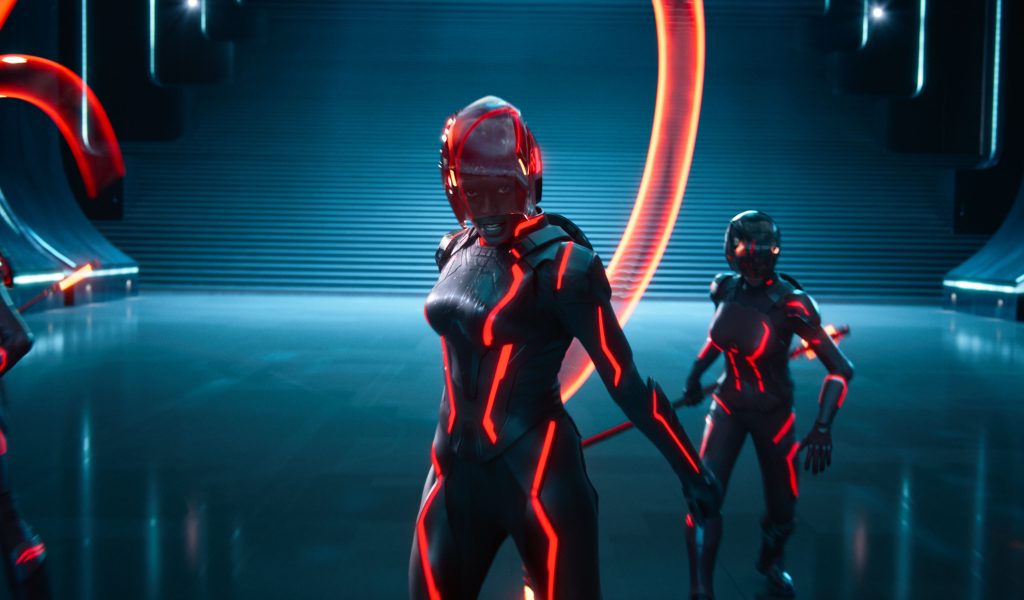It’s been 15 years since the release of Tron: Legacy, and I honestly never expected we’d see a follow-up to the film but here we are in a future where the real world and digital world more closely resemble what we’ve seen in the franchise than ever before. There is a lot that can be said about the convergence of artificial intelligence and society, and Tron: Ares builds its narrative around just that. And while the film is stunningly gorgeous with bright and bombastic visuals paired with a killer soundtrack from Nine Inch Nails, its story and characters leave much to be desired. The Grid dazzles in visual splendor, but just like the programs being brought into the real world, the novelty of it all can only last for so long before it topples under its own weight.
The tech world has been dominated by two competing companies; ENCOM, which was led by CEO Kevin Flynn until he disappeared into the Grid and is now being run by Eve Kim, and their rival Dillinger Systems, led by Julian Dillinger. Both companies are on the verge of world changing technology that would bring artificially intelligent programs off the Grid and into the real world. They’ve successfully managed to pull it off but only for 29 minutes at a time before the program derezzes itself and returns to the Grid. Both ENCOM and Dillinger Systems are racing to be the first to discover the “permanence code” that would allow them to bring to life their computer creations without them falling apart and thus change the world forever. When ENCOM cracks the code first, Julian Dillinger sends his latest artificially intelligent solider Ares after Eve to steal the code by whatever means necessary before the news can be revealed. Ares begins having thoughts of his own, however, and thinks that maybe his core directive isn’t what’s best for him or society.
Likes both Tron and Tron: Legacy, Tron: Ares is a visually stunning film to watch. There is so much attention to detail in its depiction of the virtual world aka the Grid. ENCOM’s Grid is a glowing world bathed in a soft blue light filled with trees and wide open spaces. Meanwhile, Dillinger has a darker, much more shadowy world filled with reds and oranges. The same can be said for each respective companies printing methods. ENCOM’s laser is clean and beautiful when it prints its programs in the real world. They arrive in the real world looking just like the program with no excess or waste. The same cannot be said for Dillinger. Sparks fly when their lasers are active and all of their real world prints are covered by jagged debris before the finished print emerges at the end. It’s these little details that showcase how the two companies are run.

Accompanying the dazzling visuals is the equally amazing score by Trent Reznor and Atticus Ross. Sure, it’s no Daft Punk this time around but Tron: Ares capitalizes on what they did with Tron: Legacy. The bouncing chiptunes and booming electric dance music flows through the Grid with an invigorating energy enticing to any human or program. Not only that but it keeps the film moving. There are barely any noticeable lags during its two hour runtime, which is a great thing because despite the film’s excellent visuals and scores the story could have used a few more coding revisions.
The majority of the film revolves around AI warrior Ares, played by a robotic Jared Leto (for better and/or worse), who essentially gains sentience and wants to experience the real world for longer than 29 minutes at a time. It’s a pretty standard artificial intelligence theme, and Tron: Ares doesn’t add much to it. He starts off as the villain and then becomes the good guy after disobeying his directive. It’s all very surface level, and feels extremely singular in its narrative. The film is so focused on the race for the permanence code and bringing programs into the real world, that it doesn’t really explore the bigger picture possibility of those programs being just like us, although like any franchise film it leaves that question up to a potential sequel. Behind the pretty pictures and rhythmic sounds, it’s a very surface level story with surface level performances.
And yet Tron: Ares still had me caught in its laser beam. With every film in the franchise I want to see more and more of this world they have built on the Grid. I don’t see the film leading to any meaningful conversations about technology or artificial intelligence. The soundtrack is sure to have more legs than the film itself. What it does offer is a thrilling dose of dopamine that may not last a long time, but it sure does feel good in the moment. The Tron franchise may not have a complex code, but as long as Disney keeps making them, I’ll keep watching them.
-
Tron: Ares
Summary
There is a lot that can be said about the convergence of artificial intelligence and society, and Tron: Ares builds its narrative around just that. And while the film is stunningly gorgeous with bright and bombastic visuals paired with a killer soundtrack from Nine Inch Nails, its story and characters leave much to be desired.







